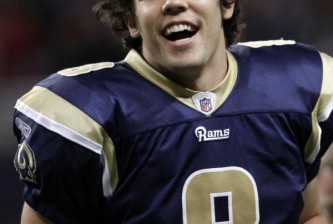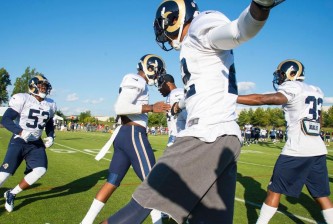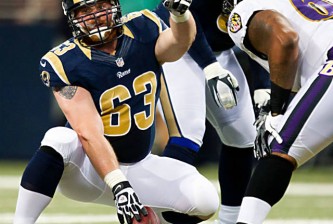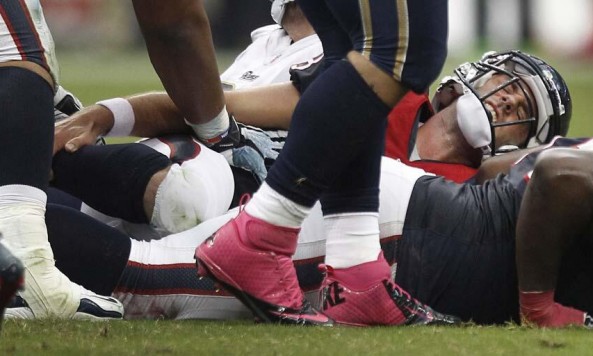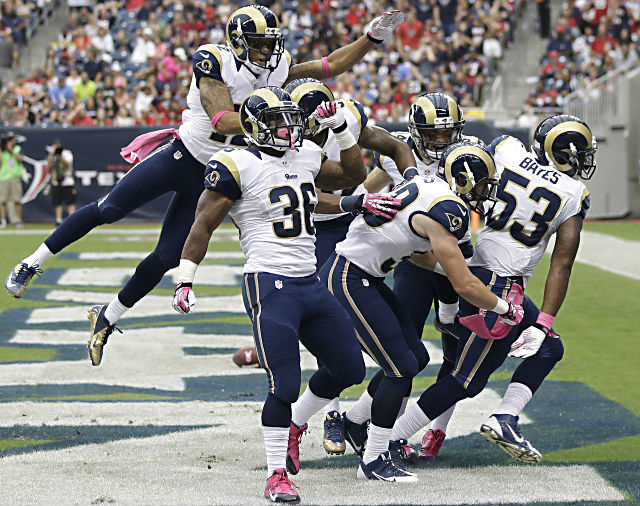
Here's how long it's been since it's been since the St Louis Rams had a game like this: my five year old son has never done so many touchdown dances in one day. In fact, he ended up injuring himself as the Rams went up 38-6 in the 3rd quarter. He may be a game-time decision next week.
The game-crowning Rams points were put on the scoreboard after a joyous field-length romp by rookie linebacker Alec Ogletree, intercepting a telegraphed pass by TJ Yates on a telegraphed play-call by Gary Kubiak down at the goal line. The play poured gasoline on a raging fire in Houston, where the fan base seems to have turned on its team, but felt like part of a rebirth on the St Louis bench.
After a confounding first month of football, the Rams are starting to combine their young talent and veteran coaching to create winning football.
"They were chanting 2-0 when they came into the locker room. That was a long preseason." – Coach Fisher #STLvsHOU
— St. Louis Rams (@STLouisRams) October 13, 2013
Let's not pretend that the Rams fixed all of the problems that have plagued them this season, but they solved two big ones this weekend against the Houston Texans: They firmly established a running game with Zac Stacy, and they cleaned up their maddening penalties on special teams. I'm not sure how the math works, but somehow that added up to a blowout win.
In fact, mathematicians might have a tough time wrapping their heads around this one. The Rams won by 25 points despite:
– only 117 yards passing from Sam Bradford
– 45 yards on two catches as the Rams' best receiving day
– 71 plays and 35 minutes of game time for the Titans' offense
– nearly 200 yards of total offense for Arian Foster
– an end to Matt Schaub's personal four-game pick-six streak
The Rams won despite any "big name" skill players having big-time games. Tavon Austin had only one catch for three yards, and only eight yards in punt return, which will no doubt inspire another round of "what's wrong with Tavon" articles. Chris Givens had a perfectly thrown deep ball go through his fingers, the difference between a 100-yard, 1-TD day and a 20-yard, no-TD day.
Instead, the offensive day was carried by the bevy of unknown and emerging weapons on the Rams. Running back Zac Stacy shouldered the load by carrying the ball 20 times for 90 hard-fought yards. Three times Stacy's tough running set up Bradford for short touchdown passes to players no opponent tries to gameplan for: Brian Quick, Lance Kendricks and Corey Harkey.
Those three touchdown drives traveled 65, 80 and 80 yards, and Brian Schottenheimer's much-maligned offense averaged 8.65 yards per play on those three drives. (Houston's defense contributed by chipping in 60 yards worth of penalties.) Bradford targeted passes at all three levels of the defense, mixing screens, intermediate and deep passes with judicious use of the run to keep JJ Watt and the Texans defense at bay.
The gameplan worked to keep Bradford's uniform nearly spotless. He wasn't sacked and was hit only three times, one of those hits turning into a signature play for the offense as Bradford still delivered a strike to Cook for a 34-yard gain. Jake Long had perhaps his best day as a Ram, holding talented pass rusher Whitney Mercilus at bay.
The end result was a surprisingly easy business trip for Bradford and company. He can thank his defense and special teams for that.
Bending Bad, Breaking Good
Haters of the "bend-not-break" philosophy must have been quietly stifling screams of dismay. The dreaded cushion-coverage was given to both Andre Johnson and Deandre Hopkins, and Matt Schaub was able to complete 78% of his passes in the first half. Arian Foster seemed to be wearing a cloak of invisibility as he slashed through the Rams' defensive line.
But on cue, the defense stiffened as the field shortened and throttled the Texans' chances. Three Houston drives in the first half, each longer than 60 yards, ended with only six points on the scoreboard.
The difference in defensive personality is stark. Discarding penalties, here is a simple breakdown of the dichotomy of how the Rams defended the Texans' offensive plays:
Outside the Rams' 20 yard line: 55 plays, 391 yards. That's a 7.1 yards-per-play average. Those plays only resulted in three points, with one fumble lost (after crossing the 20 yard line, of course).
Inside the Rams' 20 yard line: 16 plays, 29 yards. That's a 1.8 yards-per-play average. Those plays resulted in ten points and two interceptions.
Michael Brockers had a monster day as this week's shining star on the defensive line. His seven solo tackles included three TFLs and two sacks, and he laid two additional hits on the Texans' quarterbacks.
Props to the Special Teams
This is where we give our due to coach John Fassel. Nathan Kearns of Ramblin' Fan was brave enough earlier in the week to stand in the face of internet fan fury and outline the reasons why Coach Bones should keep his job, despite the unending torrent of penalties on punt returns. #KeepJohnFassel didn't exactly trend, but he made a compelling case.
#KeepJohnFassel Reason 1) The Rams punting unit is the best in the NFL right now, leading in "net yards" and allowing 2.1 yards per return
— Nathan Kearns (@nkearns12) October 8, 2013
#KeepJohnFassel Reason 2) Johnny Hekker went from being one of the most volatile punters last season to the most consistent in '14 #ProBowl
— Nathan Kearns (@nkearns12) October 8, 2013
#KeepJohnFassel Reason 3) Average starting field position for opposing teams off the kickoff is the 19 yard line, 4th best in the NFL
— Nathan Kearns (@nkearns12) October 8, 2013
#KeepJohnFassel Reason 4) 50% of the all special teams penalties are being committed by only 4 players; not necessarily an epidemic #RayRay
— Nathan Kearns (@nkearns12) October 8, 2013
#KeepJohnFassel Reason 5) THEY HAVEN'T ALLOWED A RETURN TOUCHDOWN THIS SEASON! …or even a long return, for that matter #relax
— Nathan Kearns (@nkearns12) October 8, 2013
On Sunday, not a single penalty flag flew on special teams, allowing the Rams to actually break even in the field position battle for the first time all season. Even better, budding special teams ace Daren Bates got in on the scoring action by poucing on a fumble forced by Rodney McLeod and catapulting it into the end zone for the Rams' final points.
That touchdown highlighted a ten-minute stretch of game time where Sam Bradford didn't so much as touch the field, and saw his team put 14 points of cushion on the scoreboard for him. By the time he got back under center, he didn't have to throw another pass. Six handoffs to take time off the clock, and his day was done.
Hopefully this is a trend that continues. Twitter follower John Rose said before the game that it would take a "complete game" from all three phases to win in Houston. The special teams unit finally had a complete game of their own, and you can see the result.
No Joy on the Opposite Sideline
The Houston Texans media will no doubt be happy to point out that the Texans did more to lose this game than the Rams did to win it. With nearly 100 yards in penalties in the first half alone, we might be tempted to agree, but the Rams had their part in forcing those penalties. They also did a fine job of avoiding being victimized by referee Bill Leavy's itchy trigger finger, at least until the game was out of reach.
The vitriol directed at Matt Schaub has gotten to insane levels in Houston, with fans forsaking empty Twitter threats in favor of drive-by shoutings. They cheered as Schaub writhed on the field after a sack by Chris Long, and cheered again when TJ Yates appeared to relieve him.
Cushing calls reaction of fans to Schaub's injury "barbaric." Players very upset about it. #Texans
— Tania Ganguli (@taniaganguli) October 13, 2013
The players weren't the only ones disgusted. Even credentialed media members at Reliant Stadium were taken aback.
Reliant borderline bush league right now. Cheers. #Texans
— PDS (@PatDStat) October 13, 2013
To say nothing of the national types…
I don't know that I've ever rooted harder for anything than I have for T.J. Yates to throw a pick-six here.
— Bill Barnwell (@billbarnwell) October 13, 2013
To call what happened next "karma" seems only fitting. But let's not pretend that the Houston crowd is somehow unique in its bad behavior. Bad fans are everywhere.
As a member of a fan base that has endured its own share of bad times and has its own long-standing vocal minority calling for constant change, that same scene could have easily played out here, under similar circumstances. Just last week, we had our figurative torches and pitchforks at the ready if our team had somehow lost to the Jaguars. (I made a conscious decision to tone down that kind of language after the scene in Schaub's driveway last week, though.)
The Rams have to be happy to get out of town with a win, and with a fresh start on the season. They have to be even more thankful that the troubles they leave behind in Houston are not theirs instead.




















